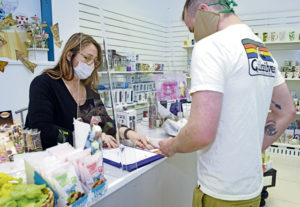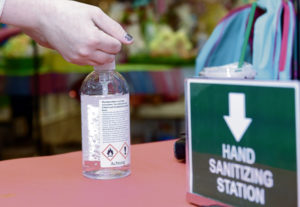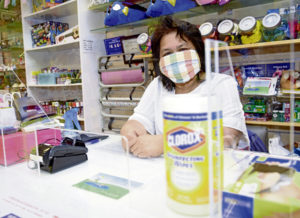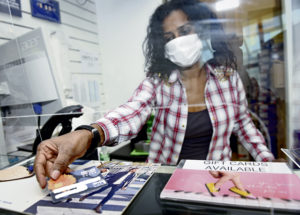
When the U.S. Department of Defense moved into Health Protection Condition Charlie at the end of March, Ramstein shut down nonessential facilities to prevent the spread of coronavirus disease 2019. Now, 86th Airlift Wing leadership aims to begin a phased approach back to normal operations.
While complying with German restrictions and considering the needs of the community, Ramstein leadership has been conducting evaluations to determine which facilities can reopen.
“(Reopening) is going to be linked to what goes on with the COVID-19 fight and in the community, and it certainly also depends on the recommendations from Public Health before we get anything else open,” said U.S. Air Force Brig. Gen. Mark R. August, 86th AW commander, during a virtual town hall, April 27.
Several vendors in the Ramstein Exchange began reopening April 20, reflecting host nation policy.
A team of advisors, including representatives from the 86th Medical Group, 86th AW Host Nation Office, 86th AW Legal Office and the 86th Mission Support Group, assist August on reopening decisions. Leadership from the 86th MDG Public Health Office and 86th Force Support Squadron joined August at the virtual town hall.

“We are making sure that our Public Health reviews all the health and hygiene and health and wellness plans before people reopen,” said Lt. Col. (Dr.) Tracy Bozung, 86th Aerospace Medicine Squadron commander. “If it’s a facility that Public Health would normally inspect, like a food facility, we will do a pre-opening inspection to make sure they’re good to go.”
Bozung said they are in communication with German Public Health officials every step of the way.
Before reopening, each Base Exchange shop was sanitized and acrylic glass shields were installed at cash registers. Further, posters explaining physical distancing rules were placed at every shop, along with hand sanitizer stations and “mind the meter” floor stickers.
After reopening, shops must observe specific guidelines to protect employees and customers. To aid adherence to the two-meter rule, a maximum of three customers per shop are allowed at the same time. BX management inspects guideline implementation.
One customer responded to the recent openings with caution.

“It’s hard to know what to feel with shops opening,” said Tawnee Conklin, Landstuhl Regional Medical Center Emergency Room medical support assistant. “We won’t know the impact until it happens. I do think it’s great that we’re implementing the precautions we are. It seems like the BX is doing the best they can.”
BX employees are also being impacted as more vendors open.
“It’s good to see people out and about and to be able to go back to work,” said Joy Shockey, Army and Air Force Exchange Service associate at a newly reopened vendor. “I think the new safety measures are good. Customers are being safe and cooperating.”
Customers began returning to shops as soon as they opened.
“It’s going well,” Shockey continued. “I think it’s a positive on both sides with management and customers.”
The 86th FSS, who oversees several services and morale programs at both Ramstein and Vogelweh, took similar precautions when opening select facilities April 27.

“Some (facilities) will be appointment only,” said Lt. Col. Natosha Reed, 86th FSS commander. “You will see physical distancing restrictions inside facilities. My personnel will be wearing masks and we ask you to do the same if you can’t keep your physical distance.”
According to Reed, 86th FSS facilities passed public health inspections prior to opening. Acrylic glass shields have also been installed to protect staff in the facilities that have reopened and most establishments will require payment via card.
During the town hall, Bozung addressed concerns that the openings could prompt a second wave of virus infections.

“I think that can be mitigated substantially if we follow requirements and requests as far as restriction of movement and physical distancing, as well as being smart,” Bozung said.
Those who do not need to leave their homes should not, Bozung said. It is up to the community to self-police.
Similar to German Chancellor Angela Merkel’s plans, wing leadership will use the next few weeks to gather data for the way forward, August said. They will look at what is working, how the situation is progressing and how well the community is responding in areas such as distancing and compliance.


